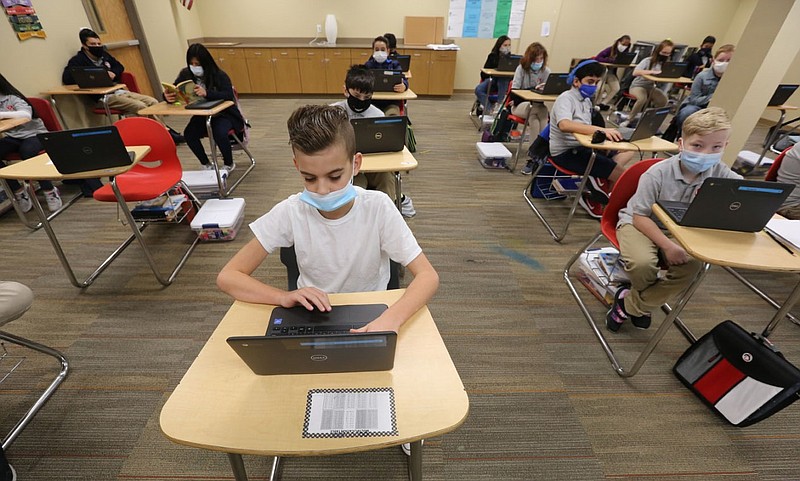Arkansas education leaders said Wednesday they are stepping up efforts to help school districts convey the importance of the state-mandated exams to parents who are reluctant to have their students take the tests on campus.
Rachel Horn, assessment director for the state Division of Elementary and Secondary Education, told the Arkansas Accountability System Steering Committee, that those efforts include training for all district test coordinators this coming week. They also include the development of a "tool kit" of resources for districts to use in communicating with parents about the state-required Aspire tests for grades three through 10 and the NWEA Measure of Academic Progress for grades kindergarten through 2.
The Aspire and Measure of Academic Progress testing of students will be done on school campuses and not remotely. The Aspire test in reading, math and science is scheduled for a five-week window, April 5 to May 7.
The student testing program is a requirement of the federal Every Student Succeeds Act. The state had a waiver of federal testing requirements this past spring in response to the coronavirus pandemic. The state doesn't have the authority to forgo the testing program a second year, state education leaders have said.
More than $371 million in annual federal funding for various education programs in Arkansas hinges on the state's compliance to the federal law.
[CORONAVIRUS: Click here for our complete coverage » arkansasonline.com/coronavirus]
The test preparations for this spring come as school districts and the state overall continue to struggle against the contagious and potentially deadly covid-19 illness caused by the coronavirus that began affecting Arkansas residents last March.
In response to the virus threat, more than 97,000, or 20%, of the state's public school students are not attending on-campus classes currently but are getting their lessons online at their homes.
Another 60,000 students, according to the state education agency, are only going to their schools part time, getting a combination of online and in-school instruction. There are more than 313,000 public school students -- about 67% -- who are attending classes on campus full time. They are doing so while wearing masks and physically distancing from one another whenever possible to limit the virus spread.
Horn said the upcoming training for district test coordinators will include suggestions for creative test scheduling to help with spacing the test-takers apart, as well as taking other precautions such as the wearing of face masks.
The tool kits, which are going to go to the testing coordinators and to family and community engagement coordinators in the school systems, will be specific to the spring testing, Horn said.
"We understand families may be anxious given the current covid context," Horn said. "We really want to make sure that families understand why it is so important that we do assess and why it's important that we are assessing on-site, and how we can make those families feel comfortable in sending their students to schools to test."
Clear communication about the safety precautions is going to be key for the districts as they work toward measuring student learning so that academic needs can be met, Horn said.
"We want to share ... that safety is our priority. It is important to measure student learning but we will do all we can to keep our students safe," she said.
The Aspire testing program calls for schools to test 95% of their students who are eligible for testing. A testing percentage below 95% is factored into the calculation of a school's Every Student Succeeds Act index score, resulting in a lower score. The calculation of the score depends largely on student test results, but also on other factors such as student attendance rates and college-entrance exam scores.
Tammie Reitenger, coordinator of school performance in the Division of Elementary and Secondary Education, told the accountability system committee Wednesday that she had met with her advisory committee recently in part to collect the concerns that district administrators and teachers -- as well as parents -- have about the on-site spring testing.
In addition to parents who don't want their children exposed to the virus, district leaders are apprehensive about achievement comparisons that might be made between in-school and remote learners, judgments that might be made on the quality of a district's online instruction and/or students being labeled based on test results.
Reitenger announced that the state's annual school report cards -- including an 88.8% four-year state graduation rate for the 2020 school year -- will be posted for public review next week. That's up from an 87.6% statewide high school graduation rate in 2019.
The report cards won't include all the categories of data that are typically included partly because the coronavirus pandemic precluded state-mandated testing last spring.
She also noted that the A-to-F letter grades applied annually to schools based on results from state-required tests were not calculated for this past 2019-20 school year and that House Bill 1151, which has been introduced in the current legislative session, calls for a suspension of the public school A to F letter rating system for this 2020-21 school year. The language of the bill states that the suspension of the A to F system is warranted due to the continuing disruption to education caused by the ongoing covid-19 pandemic.
